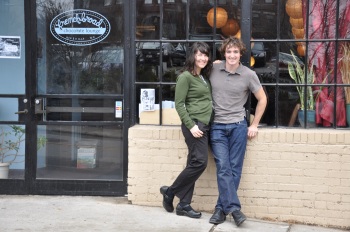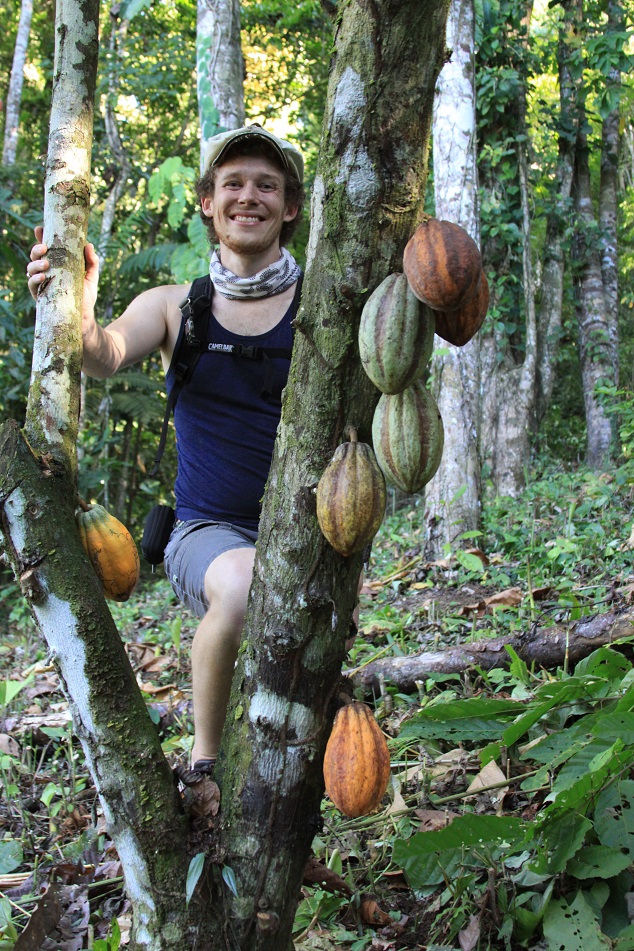This story was written by Alia Akkam, a New York-based writer and editor of Edible Queens. She developed an interest in food while studying journalism at the University of South Carolina.
The champagne was expected, but flirtatious banter with the blue-eyed bartender was not. When Jael Rattigan, now the co-founder of Asheville-based French Broad Chocolates, attended her brother’s wedding a decade ago, she found herself captivated by the gent behind the bar. Dan Rattigan, the drink-slinging law student in question, was just as intrigued by her. It wasn’t long after that the newly smitten Minneapolis couple planned a vacation to Costa Rica, and much like the beginning of their romance, proved serendipitous.
“We simultaneously fell in love with Costa Rica—and each other,” recalls Jael.
When they came back from their sojourn it was that dual passion that Jael, a budding chocolatier, would remember when sitting in her blue kitchen hand-dipping smooth chocolate turtles. “That was the moment I knew I wanted to find a life around this, around making chocolate. Until then I had been too practical, but Dan the dreamer believed in me and took me seriously,” she explains.

So much so that Dan dropped out of law school, Jael put the kibosh on her MBA and they both sold their cars. Instead they bought an old-school bus, converted it to run on vegetable oil, and with Jael expecting their first child, made an adventurous return to the Costa Rican jungle.
On the Caribbean coast, in Puerto Viejo de Limon, they got one step closer to Jael’s dream by opening the cafe Bread and Chocolate “in a dilapidated space we found on an abandoned cacao farm,” Dan points out. Dan, who had served as head cook and lead baker at co-ops throughout his time at Oberlin College, also had the chance to reignite his interest in the kitchen working alongside Jael, where they made the likes of homemade biscuits and tropical fruit salads.
Two years on the beach elicited new urban yearnings and with “chocolate on the brain,” Jael notes, they moved to Asheville on another whim, the open, artsy city friends told them would be the right fit for the artisanal business they envisioned.
“Our first visit was full of farmers’ markets, farm-to-table restaurants, and walks in town seeing sweet dads with their kiddos on their shoulders,” Jael says. Adds Dan, “We can identify with the spirit of Appalachia. It’s relatively isolated in the mountains, similar to Costa Rica.”
Now the parents of two little boys, they started making truffles and caramels sold in elegant jewelry boxes adorned with letterpress labels. Their confections appeared in the very farmers markets they were enamored with, grocery stores, and on the web, until 2008 when they scored a plumb retail space downtown just off the main drag.
More than just a spot to pop in and buy dense cacao nib brownies or lemongrass green chile truffles dusted with sprinkled coconut while en route to a dinner party, the three-story pine and exposed brick shop doubles as an inviting café and salon. The leather sofa is the site of many evening dates over liquid truffles—the Rattigans’ rich, dark version of hot sipping chocolate—and the tables buzz with friends sharing slices of sea salt-accented olive oil chocolate cake. Jael, who has the earthy, calming presence of a yoga teacher, and Dan, whose boyish looks are amplified by the scooter he rides to work, are calming fixtures, weaving in and out of the space and saying hello to loyal regulars.
Asheville’s robust locavore movement is part of the allure for the couple, who incorporate local raspberries, malted barley from Riverbend Malt House, and lavender from the sustainable Mountain Farm in Burnsville into their chocolates. The café au lait truffle contains cream steeped in beans from Durham-based Counter Culture coffee, while molasses grown in nearby Marshall makes its way into the sorghum caramel.

Between this reverence for fresh and organic, as well as those heady memories of Costa Rica, where the desserts they served featured locally made chocolate, the next ambitious move for Jael and Dan was opening an ethical bean-to-bar chocolate factory a few blocks away.
“We were spending all this time sourcing superb quality, wholesome ingredients and building relationships with our partners, that we felt we needed to do the same with our chocolate. If there are things we can get directly from the farmers, we should,” says Dan. “How can we improve prevailing business models? It’s about spreading a set of values and ideas worth sharing. We knew we had to do it ourselves.”

So they did, sourcing cacao beans straight from the cooperatives of hardworking growers in locales such as Costa Rica (even from the magical farm they owned nearly 10 years ago), Peru, Bolivia, and Nicaragua that now sit in their factory in burlap sacks. They do everything by hand: sort, roast, crack, winnow, conch, refine, and temper it all into silken chocolate using machinery like a nib classifier, sorter, and evolving solar-powered roaster that the crafty Dan built himself.
Every weekend there are tours of the factory, where the chocolate-making process is demystified to curious locals and tourists. But it’s the lush images of Costa Rica and Peru gracing the walls of the factory that reinforce the connection between the farms that made those impeccably wrapped bars for sale a possibility. For the Rattigans, global and local are forever intertwined.

— Lindsey Kate Reynolds, Southern Foodways Allinaces.org
